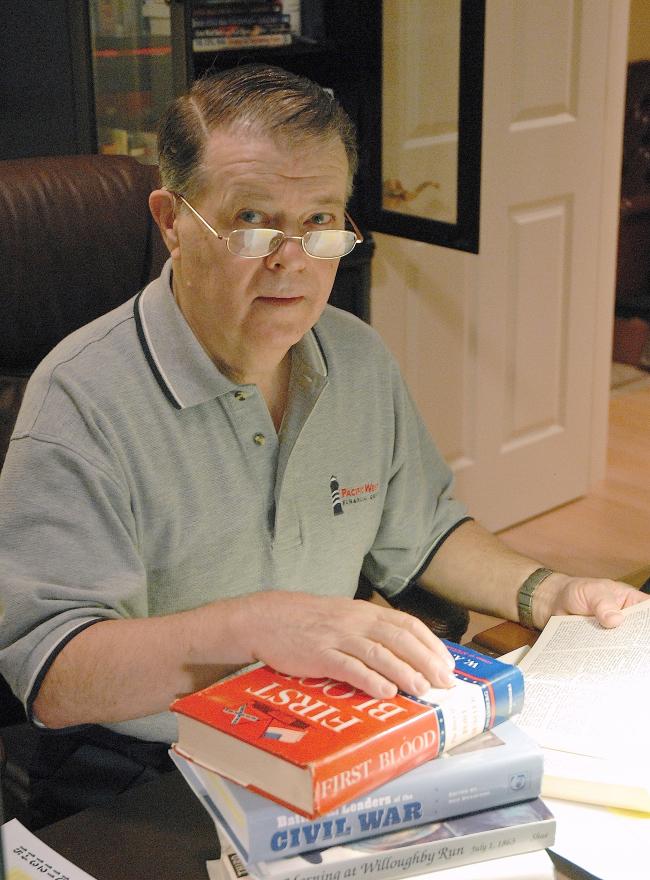" U.S. Civil War- Beyond the Battles" to be taught at SSCC Continuing Ed.
Tue, 01/26/2010
Interested in revisiting the Civil War beyond the battles? Pete Mazza is an authority on the conflict that took the lives of over 600,000 Americans and ended some 100 years prior to the Voting Rights Act. Mazza will teach “The U.S. Civil War- Beyond the Battles” at South Seattle Community College Continuing Education Department beginning Feb. 2. (That’s just 10 days before President Lincoln’s birthday.)
“The best thing I can do instead of regurgitating battles is to try to mine and weave together how these battles were indications of the economic, social and political fabric of the times and what it came to be as times went on,” said Mazza, 68, who retired from banking, insurance and investing at Mazza Financial. He attended Dickenson College, just 30 miles from the Battle of Gettysburg, in Pennsylvania, which he said helped fuel his interest in the Civil War.
“In the last 135 years since the end of the war, over 50,000 books, essays, pamphlets and graduate theses have been published,” he said. “And more are coming out all the time."
Mazza said that in the 100 years following the end of the Civil War, over 5,000 African Americans were murdered by lynching.
"We still have a lot of questions about that time and what it meant in the metamorphosis of the country. It is still compelling, the fulcrum event in American History.”
Civil War books crowd Mazza’s home. Doris Kearns Goodwin’s “Team of Rivals: The Political Genius of Abraham Lincoln” sits open on a wooden reading stand in his living room.
“Lincoln had his eye on the ball, maintaining the Union, representative of democracy,” said Mazza. “The flame was put out, and had a rough start to get reignited here. Our foreign ‘friends’ were watching, as most nations were still run by monarchs.
“Predominantly in the North, the changing roll of women was the engine room that started the women’s rights movement, voting, working jobs once held only by men. Before the war there was a negative feeling about a spinster. Well, when so many became widowed, that took away that coloration.”
While Mazza is prone to quote Shelby Foote, noted Civil War historian and author, he said he was taken by “Mary Chestnut’s Civil War,” a Pulitzer Prize-winning compilation of her diary.
“Mary and her husband James were very highly placed in Charleston, South Carolina society,” said Mazza. “He was a general in the Confederacy and served in Jefferson Davis’ cabinet. Mary wrote about almost everything she saw or heard during the war, and kept an extensive diary.
She writes about the imploding and dissolution of Confederate society during the war, and how it was changing the roll of women from the ‘Gone with the Wind’ stereotype to having to deal with some very heavy issues in terms of their own self preservation and preserving their property when their husbands were away at war. It was a very difficult time on a very personal level for her.
“I try to make the class personal,” he said. “I often get the question in the class, ‘What compelled them to serve and to stay?’ I read the class a letter by Sullivan Ballou, a Major in the 2nd Rhode Island Volunteers written to Sarah, the soldier’s wife, July 14, 1861, from Camp Clark, Washington, D.C. In it he writes,
‘I have no misgivings about, or lack of confidence in the cause in which I am engaged (…) I know how American Civilization now leans upon the triumph of the government and how great we owe a debt to those who went before us through the blood and suffering of the Revolution (…) If I do not return, my dear Sarah, never forget how much I loved you, nor that when my last breath escapes me on the battle field, it will whisper your name.’
“He was killed a week later in the 1st Battle of Bull Run,” said Mazza. “It cuts to the point of motivation that a lot of these guys had. It’s on both sides.”
For information on this class go to: www.learnatsouth.org or phone (206) 764-5339.


